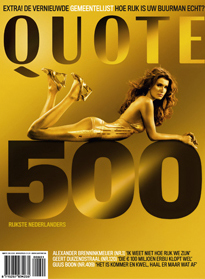On 7 November 2008 Hachette Filipacchi Media Netherlands B.V. – in its capacity as publisher of the business magazine Quote – filed an ex parte request against the company Mediamaatjes B.V. of, inter alia, former Quote editor-in-chief Jort Kelder.
The Dispute
Each year Quote publishes the well-known Quote-500 list in a special edition. In this list the 500 richest Dutch people with their estimated assets are mentioned. The reference date for the determination of the assets was 1 August 2008 and the publication date of the Quote-500 magazine was 6 November 2008. According to Mediamaatjes, due to the turbulent times on the financial markets, on the date of publication of the magazine the estimated assets in the Quote 500 were out of date. Next, Mediamaatjes published a corrected version on its website http://925.nl/. This corrected list is the Quote-500 list adjusted by a calculating tool named Stoxx.

Hachette argued that Mediamaatjes used the Quote-500 list for the corrected list, without itself having invested in the composition thereof. Hachette wanted to defend itself against the publication of the list corrected by Mediamaatjes and claimed a ban on publication.
Hachette primarily argued that Mediamaatjes was infringing its database right and, alternatively, that it was infringing the copyright protection of impersonal documents. This last claim was not further discussed because the case was dealt with on the basis of database law.
The Adjudication: Is the Quote 500 a Database?
The Court in preliminary relief proceedings ruled that the Quote 500 as such can be regarded as a database and thus follows the argument of Hachette that the list meets the four requirements in this respect, namely:
a collection of independent works, data or other materials;
arranged in a systematic or methodical way; and
individually accessible by electronic or other means;
and for which the acquisition, control or presentation of the contents, evaluated qualitatively or quantitatively, bears witness to a substantial investment (Section 1 under a Database Act).
Mediamaatjes extracted the contents of and reused the database within the meaning of Section 2 (1) under a of the Database Act, now that Mediamaatjes copied the database in its entirety, transferred the contents thereof to its website and published the database on its website with the application of a correction factor.
Hachette’s claim is allowed by the Court in preliminary relief proceedings on the basis of database law. Mediamaatjes must cease and desist publication. The Court in preliminary relief proceedings furthermore ordered Mediamaatjes to pay a penalty of EUR50,000 for each day or part thereof that Mediamaatjes acts in violation of this ban.
Conclusion
It follows from the petition that the making of the Quote 500 is not a spin-off of the main activities of the publisher, but that the Quote 500 itself is the main activity of an editorial staff that was especially appointed for that purpose. The yearly costs of making the Quote 500 are EUR269,000. Thus, according to the Court in preliminary relief proceedings, Hachette sufficiently substantiated in its petition that there is a “substantial investment”. Now that the other requirements have also been met, in this case Hachette showed that the Quote 500 can be regarded as a database, and therefore enjoys protection under the Database Act.
This case is a fine example of the application of an ex parte ban as a means of putting pressure in order to enforce database law as a result of which, probably with a view to the danger of forfeiting high penalties, Mediamaatjes removed the adjusted rich list from its internet page.

